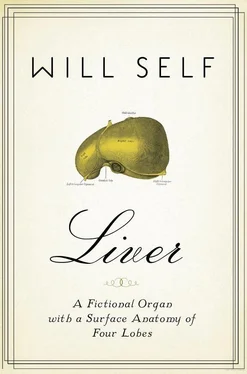‘My father.’ Athene, despite his revelations, and the vulture’s presence — its antediluvian vibe, its reek of nitrogen and rotting flesh — was disengaged, bored.
The vulture was becoming more agitated, spluttering and chuckling, working her head up the back of Prometheus’s clothes, desperate to feed. ‘I have to. ’ He gestured hopelessly.
‘What’re you saying — that the two of you require privacy?’
‘N-No, not exactly privacy, but somewhere out of the way.’
‘I should’ve bloody realized,’ Athene mused; ‘the stains on your futon, and I thought it was my period — then that creepy doctor came.’
‘Yeah, yeah, he is a creep, isn’t he. No, we — she — doesn’t need privacy, just somewhere I can sorta bend over and be, um, braced . I normally do it on the bog.’
‘No.’ Athene was emphatic. ‘This I’ve got to see.’
She led Prometheus back to the main room of the penthouse and pointed to the tree trunk. ‘How about there? You can brace yourself against that.’
‘It’s hardly private, Athene. This is a glass box — anyone could see.’
‘Bullshit!’ Her colour was up: two burning spots in the centre of each olive cheek. ‘No one can see in here — unless they’re sitting on top of Tate Britain with a fucking telescope. Now, get on with it — that bloody bird’s starting to nauseate me.’
Which was fair enough, because there was something not right with the vulture; her talons scrabbled on the marble floor, her wings hung limp, and her deep chest spasmed. Prometheus stepped towards her, then, arrested by Athene’s furious scowl, retreated to the columnar tree trunk. He took off his sorrel jacket, then began to pull his mushroom shirt over his head. The bird was sick — that much was obvious. He was gripped by dread: if she couldn’t feed, then what of him? He knew that what they had was a compact: her liverish treat gave him his gift of the gab, and so won Titan their new business; deprived of it, he’d be only another pedlar, crying his wares without the city walls.
Prometheus turned his back on the bird, and, bending over, shackled himself to the petrified wood with his own arms. He willed the vulture to be peckish.
Athene cried, ‘Oh my God!’ Prometheus whipped upright as the vulture arched her long neck and began to wretch. Together they watched, appalled, as a lump travelled up the bird’s gullet; she coughed, then evacuated rubbery red chunks across the liverish marble floor. Blood and bile splattered the legs of Athene’s sky-blue satin lounging pyjamas — she leapt for the shelter of the dead tree. But Prometheus went forward.
And knelt. How could this be? He sensed recognition in the regurgitated carrion: it knows me, he thought, and — more to the point — I know it. He picked up a chunk between thumb and forefinger, then held it to his nostrils; the vulture made a lunge for it with her imperious beak. Prometheus beat her off. ‘You fucking murderer!’ he shouted. ‘I know whose this is — I know.’
Athene was no longer repulsed — it was all too strange for that. In lieu of repulsion she felt that overwhelming need for comfort that she remembered from mummyless childhood; so, like any other hurting little girl, keeping the tree between them, she backed away from bird and man and blood, and ran to her bedroom. Atop the dais of her bed, curled up on a tasselled cushion, lay a cute Scottish terrier, a tartan ribbon tied round its furry white neck. ‘An-gus!’ Athene sang. ‘An-gus, come to Mama!’
The puppy raised himself up on his paws, his tufty eyebrows twitching; with his bearded muzzle and squared-off head, he had the angrily seraphic expression of Nietzsche after the philosopher’s syphilitic breakdown. ‘Come to Mama,’ Athene called again; however, the Scottie had other, more significant impressions: a line of fresh meat aroma had been cast into the bedroom, and the hook had caught in his nose. He sprang from the bed, went wide to avoid Mama’s open arms, and was gone.
‘Epimetheus, oh Epimetheus — you poor guy!’ Back by the framed hyper-realist paintings of night-time London, Prometheus sobbed over the chunk of liver. ‘I should’ve paid attention — I should’ve listened to you.’
An absurd spectacle, no? A man, stripped to the waist, and addressing a bit of meat as if it were his boyhood friend. Not so, for Prometheus, so long a stranger to the backward look, now saw the whole terrain revealed. He saw the futile obsession that Epimetheus had for Pandora — a mad love that would lose him most of his liver, and perhaps also his life — and he surveyed the delusive hope that blanketed all human affairs, blanketed them like a toxic miasma, a smog over a city. Tightly woven, thickly piled hope, beneath which trundled millions of lice, buying and fucking, eating and sleeping, loving and working; hope, which hid them from the godlike perspective of their own, evolved consciousness.
Yes, Prometheus recognized that this was Epimetheus’s liver, and realized also what it contained: it was he who was the technician able to analyse the biopsy the bird had performed. Every human misfortune was in Pandora’s box, but the worst of all was delusive hope — and it was this that Prometheus had been feeding on. The delusive hope that this purchase, that sex act, those shoes, this person, another meal. would make it all right ; and so, fashioned from mortal clay and shaped with costly bottled mineral water, they would go on and on until the big firing.
The Scottie raced across the marble floor yapping madly; the vulture, hissing, stretched out her fearsome wings and back-flapped from the mess of adman. The Scottie leapt to snap the meaty titbit from Prometheus’s fingers — ‘Tap!’ The steel frame of Zeus’s penthouse shuddered, then shrank. And why, thought Prometheus, haven’t I noticed before now that here in Zeus’s own home, there’s no branded thing? ‘Tap!’ The half-naked man bending over to pet the cute puppy — at least, that’s what any lazy viewer would think, seeing this single image graven for all eternity. ‘Tap!’ It would’ve been so reassuring to have been able to think of it all as a myth, a fable or a dream, but, as Neil Bolton’s portentous voice-over came rolling upriver — ‘Give your dog Scottie’s Liver Treats and show him you love him as much as he loves you’ — Prometheus was gnawed at by the most excruciating end-line conceivable.
It was all an advert.
What’s my name? My name is legion, for I — we — are many. Many and colourless. I’m in him — and her, and them; I’m in some of those over there, the ones shopping for travel adaptors in Dixons. The pair of semi-whores — squeaking on high stools in leather skirts, eating caviar with their sour daddy at the granite lip of the seafood bar — I’m far deeper in them than he’ll ever be. As for that one, I’m most definitely in him, I’m loaded into him, the windy horse of a cleaner who, emaciated in his worn blue-denim fatigues, is invisible to these fervent believers in universal healthcare: the African, pulling his cartload of bleach and plastic bags from one village-sized toilet to the next.
I am not death, for death has no persona; death is only an absence — not even a mask. True, for some I am death’s helpmeet, but I’m not a psychopath, only a cytopath. I, too, am alive. I, too, have feelings — ethics as well. If I am known at all, it’s by my effects rather than my causes; in this I am antithetical to humans’ gods. Be that as it may, I am powerful, I am ancient, I am constantly changing, and I — we — are, if not omniscient, privy to a lot.
Y’know, some bio-theologians think I’m the First Cause, a primitive form of all the life on this dirt ball — that every animal evolved from an organism like me; others take the contrary view, that I — we — are fallen angels, cast out from the heaven of advancement, deselected and so become parasitic and unsexed.
Читать дальше












